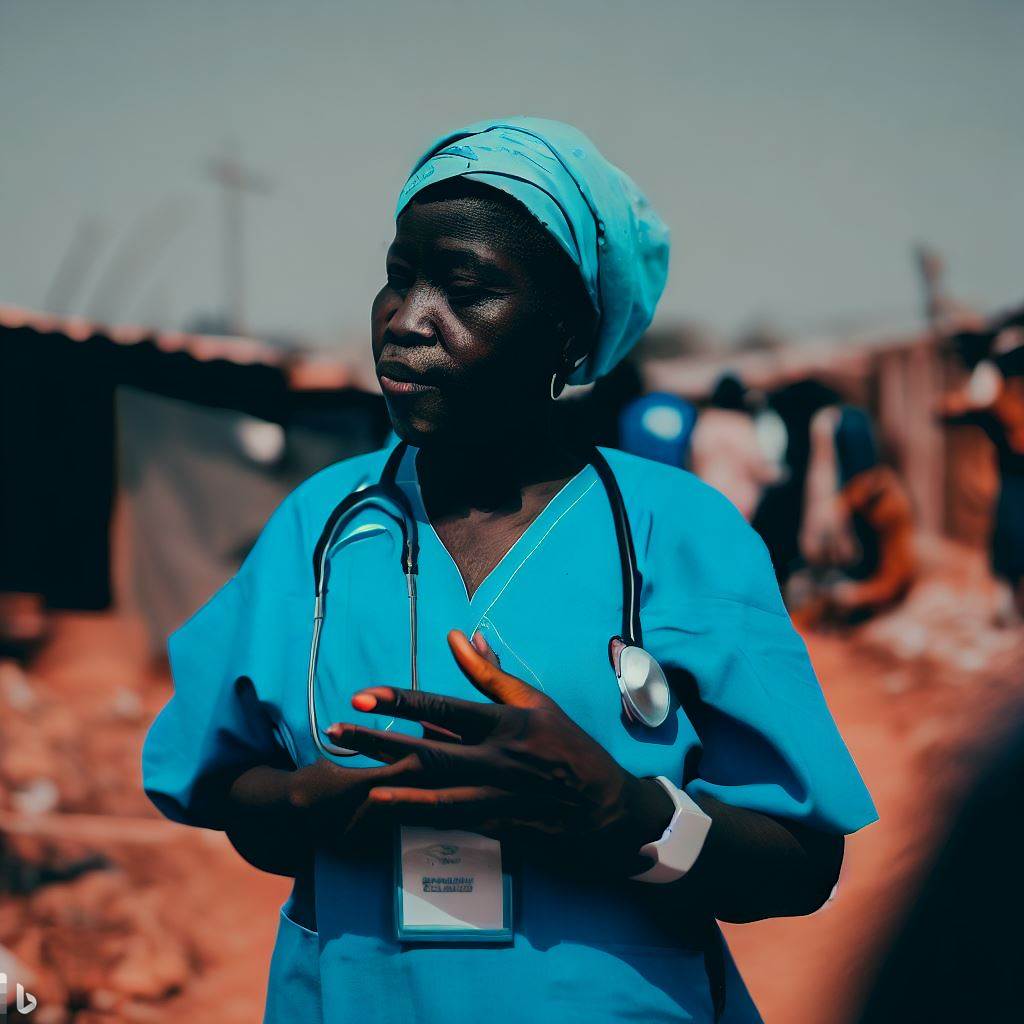Introduction
With just 0.5 doctors per 1,000 people, Nigeria grapples with a severe public health crisis.
This underscores the vital importance of healthcare professionals in enhancing societal well-being. Nurses, in particular, play a critical role in improving public health through their diverse initiatives and responsibilities.
Nurses in Nigeria are instrumental in mitigating the healthcare challenges faced by the nation.
They provide essential care, education, and support to communities, making a significant impact on overall health outcomes.
These healthcare professionals are on the frontlines, delivering vital services and improving access to medical assistance, especially in underserved regions.
By implementing various public health initiatives, nurses promote preventive care and raise awareness about key health issues.
Their efforts in vaccination campaigns, maternal and child health programs, and disease prevention initiatives contribute immensely to better health outcomes across the country.
Furthermore, nurses serve as advocates for health equity, working towards reducing disparities and ensuring that healthcare services are accessible to all.
Their commitment and expertise in patient care and health education are essential in fostering healthier communities in Nigeria.
To sum it up, the pivotal role of nurses in Nigeria cannot be overstated.
Their impact on public health is undeniable, as they work diligently to address the nation’s health challenges, improve well-being, and promote a healthier society for all.
The Current State of Public Health in Nigeria
The major public health challenges faced by Nigeria
Nigeria, as a developing country, faces several significant public health challenges.
One of the most pressing issues is the prevalence of infectious diseases. Malaria, tuberculosis, HIV/AIDS, and cholera are among the prominent diseases affecting the population.
In addition to infectious diseases, Nigeria’s healthcare infrastructure is insufficient to meet the needs of its population.
Inadequate healthcare facilities, equipment, and skilled healthcare professionals contribute to the problem.
Moreover, limited access to quality healthcare exacerbates the challenges faced by Nigerians.
Many people, especially those living in rural areas, do not have easy access to healthcare services, leading to delayed or inadequate treatment.
Relevant statistics/data to support the gravity of the situation
The statistics regarding public health in Nigeria are alarming.
According to the World Health Organization (WHO), Nigeria accounts for approximately 25% of malaria cases worldwide, with over 300,000 deaths annually attributed to the disease.
The country also has one of the highest tuberculosis burdens globally, with an estimated 429,000 incident cases in 2019.
Additionally, Nigeria has the second-highest burden of HIV/AIDS globally, with approximately 3.4 million people living with the virus.
Regarding healthcare infrastructure, only about 35% of Nigerians have access to basic healthcare services, while only 3% have access to comprehensive healthcare services.
These statistics highlight the urgent need for improvement in public health infrastructure and accessibility.
The impact of poor public health on the country’s population, economy, and overall development
Poor public health poses significant consequences for Nigeria’s population, economy, and overall development.
The high prevalence of infectious diseases leads to increased mortality rates, especially among vulnerable populations such as children and pregnant women.
Furthermore, the burden of these diseases puts immense pressure on the healthcare system, resulting in increased healthcare costs and reduced productivity.
The economic implications are substantial, as individuals and families often face financial hardship due to healthcare expenses and the loss of income from illness or death.
In terms of overall development, poor public health hinders progress in various sectors. A sick and unproductive population hampers educational attainment, workforce productivity, and economic growth.
Moreover, the perception of Nigeria as a country with significant health challenges can deter foreign investment and limit opportunities for social and economic development.
Improving public health is not just a matter of humanitarian concern but also crucial for the long-term development of the nation.
In a nutshell, Nigeria faces major public health challenges, including infectious diseases, inadequate healthcare infrastructure, and limited access to quality healthcare.
The gravity of the situation is evident from statistics indicating high disease burdens and low healthcare accessibility.
These challenges have detrimental effects on the population, economy, and overall development of Nigeria.
Efforts must be made to address these issues through improved healthcare infrastructure, increased access to quality healthcare, and effective disease prevention and control measures.
Read: The Path to Becoming a Surgeon in Nigeria
The Role of Nurses in Public Health
Nurses play a vital role in improving public health in Nigeria. With their unique skills and knowledge, they contribute significantly to addressing key public health issues.
In this section, we will explore the responsibilities of nurses, their unique skills, and the importance of collaboration in creating a healthier nation.
Responsibilities of Nurses in Addressing Public Health Issues
Health Promotion and Disease Prevention:
Nurses are responsible for promoting healthy lifestyles and preventing diseases among individuals and communities.
They educate the public on the importance of exercise, proper nutrition, and regular health screenings to identify health risks early.
Providing Primary Healthcare Services:
Nurses serve as the frontline providers of primary healthcare services, especially in underserved areas.
They assess patients, diagnose illnesses, prescribe medications, and provide ongoing care for various health conditions. Their expertise ensures that individuals receive necessary healthcare services promptly.
Immunization and Vaccination Campaigns:
Nurses play a crucial role in administering immunizations and participating in vaccination campaigns.
They ensure that individuals of all ages receive necessary vaccines, preventing the spread of infectious diseases and protecting public health.
Conducting Health Education and Awareness Programs:
Nurses are responsible for organizing and conducting health education and awareness programs in communities.
They disseminate information on health topics, teach prevention strategies, and encourage individuals to adopt healthy behaviors.
By empowering communities with knowledge, nurses help prevent illnesses and promote overall well-being.
Read: Top Institutions to Study Phlebotomy in Nigeria
Unique Skills and Knowledge of Nurses in Public Health Initiatives
Nurses possess a unique set of skills and knowledge that makes them indispensable in public health initiatives.
Their comprehensive education equips them with the ability to assess, plan, implement, and evaluate various healthcare interventions.
Their expertise in clinical care, community health, and health promotion make them versatile professionals for addressing public health challenges.
Importance of Collaboration between Nurses, Healthcare Professionals, and the Government
Collaboration between nurses, healthcare professionals, and the government is crucial to effectively address public health challenges.
Nurses work closely with doctors, pharmacists, public health officers, and policymakers to develop and implement health initiatives.
Their collaborative efforts ensure comprehensive and coordinated healthcare services, efficient use of resources, and the implementation of evidence-based practices.
Moreover, working collaboratively allows nurses to advocate for policy changes and reforms that promote public health.
By actively engaging with the government, nurses can influence healthcare policies, allocate resources, and improve the overall health system.
In short, nurses have a significant impact on improving public health in Nigeria.
Through their responsibilities in health promotion, disease prevention, primary healthcare services, immunization campaigns, and health education programs, they safeguard the well-being of individuals and communities.
With their unique skills and knowledge, nurses are key players in public health initiatives.
Collaboration between nurses, healthcare professionals, and the government is paramount in addressing public health challenges effectively.
Together, they can create a healthier Nigeria for all its citizens.
Read: The Average Salary of Nurses in Nigeria: An Insight

Nurses as Change Agents in Nigeria
Various ways nurses are making a positive impact in public health
- Establishing community health centers and clinics in rural areas.
- Leading initiatives to combat infectious diseases and epidemics.
- Advocating for improved healthcare policies and regulations.
- Participating in research studies to advance healthcare practices.
Examples or success stories of nurses who have made significant contributions to public health in Nigeria
Nurse Aisha established a community health center in a remote village, providing essential healthcare services to the residents. She played a crucial role in improving public health in the area.
Nurse Bello led a successful initiative to combat a widespread outbreak of malaria.
Through awareness campaigns and prevention strategies, he significantly reduced the number of cases in the affected communities.
Nurse Chidi advocated for improved healthcare policies and regulations to ensure better access to healthcare for all Nigerians. Her efforts led to the implementation of new policies, benefiting the entire population.
Nurse Dami actively participated in research studies focused on finding innovative healthcare practices. Her contributions helped in developing more effective treatments and interventions for various diseases.
How nurses’ efforts have positively affected the overall health and well-being of the Nigerian population
Nurses’ efforts have had a profound impact on the overall health and well-being of the Nigerian population.
By establishing community health centers and clinics in rural areas, nurses have brought healthcare closer to those who need it the most.
This has resulted in improved access to essential health services for marginalized communities and has helped in preventing the escalation of minor health issues into more serious conditions.
Through their leadership in combating infectious diseases and epidemics, nurses have played a crucial role in reducing the burden of diseases in Nigeria.
Their expertise in disease prevention, early detection, and treatment has saved countless lives and minimized the spread of infectious diseases within communities.
Nurses’ advocacy for improved healthcare policies and regulations has led to significant advancements in the Nigerian healthcare system.
Their efforts have helped in securing adequate resources, funding, and infrastructure, ensuring that all Nigerians have access to quality healthcare services.
Additionally, their involvement in research studies has contributed to the advancement of evidence-based healthcare practices, leading to better patient outcomes and improved overall health.
Overall, nurses in Nigeria have proven to be essential change agents in public health.
By actively contributing to the improvement of healthcare services, they have positively impacted the lives of individuals and communities throughout the country.
Their dedication, expertise, and advocacy have transformed the public health landscape in Nigeria and continue to make a significant difference in the well-being of the Nigerian population.
Read: Understanding the Massage Therapy Industry in Nigeria
Challenges Faced by Nurses in Improving Public Health
Obstacles nurses encounter when trying to improve public health in Nigeria
- Limited resources and funding for healthcare facilities.
- Inadequate staffing and high patient-to-nurse ratios.
- Lack of recognition and support from the government.
Negative consequences of these challenges on nurses’ ability to make a substantial impact
The limited resources and funding for healthcare facilities pose significant challenges for nurses in Nigeria.
The lack of necessary equipment, medications, and infrastructure hinders their ability to provide quality care and improve public health outcomes.
Additionally, inadequate staffing and high patient-to-nurse ratios result in increased workloads and burnout among nurses, compromising their effectiveness in addressing public health issues.
Furthermore, the lack of recognition and support from the government further demoralizes nurses and discourages their efforts to make a substantial impact.
Importance of addressing these challenges through effective healthcare policies, increased funding, and improved working conditions for nurses
In order to overcome these challenges and enhance nurses’ ability to improve public health in Nigeria, it is crucial to address them through various strategies.
Firstly, effective healthcare policies should be developed and implemented to ensure adequate allocation of resources and funding for healthcare facilities.
This will enable nurses to have access to the necessary tools and materials to provide quality care. Secondly, there is a need for increased funding in the healthcare sector specifically directed towards nursing services.
This will help in recruiting and retaining more nurses, thereby reducing patient-to-nurse ratios and improving the overall quality of care.
Finally, improved working conditions for nurses, including better remuneration, career advancement opportunities, and supportive environments, are essential to motivate and retain skilled professionals in the field.
Publish Your Professional Profile, Business or Brand
Showcase your expertise, gain trust, and boost visibility instantly on Professions.ng.
Publish NowBy addressing these challenges, the Nigerian healthcare system can harness the full potential of nurses and unlock their ability to make a substantial impact on public health.
Nurses play a critical role in preventive care, health promotion, and disease management, and their contributions are invaluable in achieving better health outcomes for the Nigerian population.
Recognizing and addressing the challenges they face is not only vital for their professional development but also for the overall improvement of public health in Nigeria.
Read: Balancing Life and Work: A Guide for Nigerian Nurses
The Way Forward: Enhancing Nurses’ Role in Public Health
Potential solutions for empowering nurses to improve public health in Nigeria
- Strengthening nursing education and training programs to ensure nurses have the necessary skills.
- Providing professional development opportunities for nurses to enhance their knowledge and expertise.
- Increasing collaboration between healthcare organizations, government agencies, and nursing associations to foster a unified approach.
The need for increased support, recognition, and resources for nurses in their public health efforts
Nurses require support, recognition, and resources to effectively contribute to public health improvements in Nigeria.
Call to action, urging stakeholders to invest in nursing and prioritize public health improvements in Nigeria
It is crucial for stakeholders to invest in nursing, recognize the impact nurses have on public health, and prioritize initiatives that enhance healthcare outcomes.
Nigeria can only achieve sustainable improvements in public health through a strong and empowered nursing workforce.
Read: How to Advance Your Nursing Career in Nigeria
Conclusion
Nurses play a critical role in improving public health in Nigeria by providing vital healthcare services.
The impact of nurses in enhancing public health in Nigeria cannot be underestimated.
On a final note, nurses have the potential to bring about positive change in public health. It is important to support their efforts and recognize their significance in improving the overall health of the Nigerian population.




